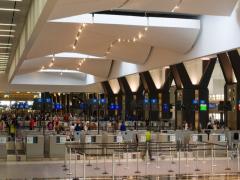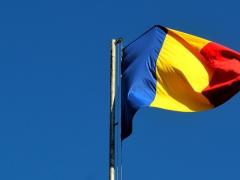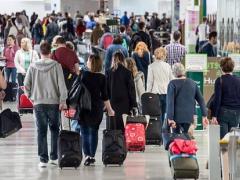AN AIRPORT employee who
was suspended for soliciting
unwarranted ‘fines’ from a
group of schoolgirls, who, he
claimed, were not carrying
the correct documentation
according to South Africa’s new
immigration regulations, was
not a Home Affairs immigration
official but a staff member of
the aviation security company,
Checkport.
Asata recently released a
statement saying an airport
official had been suspended
following an incident with
a group of 16-year-old girls
travelling on a student
exchange, who were forced to
accompany the airport person
to an ‘interview’ room, where
he claimed they did not have
the correct paperwork to travel
and demanded a R500 ‘fine’
be paid before they were
allowed to fly. This is despite
their documents having been
vetted previously by their travel
agent and accepted by the
airline staff upon check-in as
valid.
TNW has now confirmed that
it was not an airport official
but a Checkport employee who
was suspended and has now
been dismissed.
Checkport ceo, Basie
Broekman, told TNW the
employee had been identified
thanks to a picture taken by
the girls on the night of the
incident. After a disciplinary
hearing, the employee was
dismissed and blacklisted to
prevent him from working at
any airport in South Africa.
The R500 was taken from
his salary and reimbursed
to the victims. “We have
a zero tolerance policy for
such behaviour and will deal
with these kinds of incidents
quickly and severely.”
Checkport is a division
of ground handling service
company, Swissport, and
handles check-in security and
gate security. Checkport is
a separate legal entity from
Swissport South Africa with its
own set-up and management.
Peter Kohl, ceo of Swissport
in South Africa, told TNW:
“These kinds of incidents
tarnish the reputation of the
airport and the country. To prey
on unaccompanied minors,
the weakest of the travelling
public, is shameful.”
The incident has fuelled
criticism of the new
immigration regulations
that require minors to carry
unabridged birth certificates
and additional documentation
when travelling to and from
South Africa, raising serious
concerns within the travel
trade regarding the safety of
minors travelling alone.
“Absolutely disgusting to prey
on children. This is as bad as
trafficking kids – scaring them
so badly with such extortion,”
was the reaction of one travel
agent commenting on TNW’s
sister publication eTNW.
Another agent said this would
be “just the beginning of the
nightmare”, with worse still to
come.
“It’s high time Minister
Gigaba does his job,” David
Frost, ceo of Satsa told
TNW. He said it had been
established that there had
been a total of 23 cases of
child trafficking in South Africa
in the past three years. He
added that child trafficking
should be dealt with by the
police and Interpol. The burden
should not be shifted to airline
personnel.
It is unfair to assign
this incident to the new
regulations, which have been
implemented to address
the genuine issue of child
protection, said Home Affairs
spokesperson, Mayihlome
Tshwete. He said that,
although corrupt individuals
obviously needed to be dealt
with, this didn’t mean the
entire regulation needed to
be scrapped. “Should we also
resort to scrapping all driver’s
licences because there are
some corrupt police officers
at the side of the road bribing
innocent road users?” he
said.
Mayihlome said to prevent
these kinds of incidents,
parents should talk their
children and inform them
of the rules and regulations
so that they are fully aware
of their rights. Younger
unaccompanied children
should always be escorted
through the airport by airline
staff, according to Mayihlome.
Some agents have started
requesting ‘meet and greet’
services for unaccompanied
minors. Michi Messner,
Qantas regional manager for
Africa, told TNW the airline
escorted a group of schoolgirls
through security after their
agent had expressed concern,
following news of the incident.
She said, however, that this
was not a standard service
the airline was offering for all
minor travellers.












